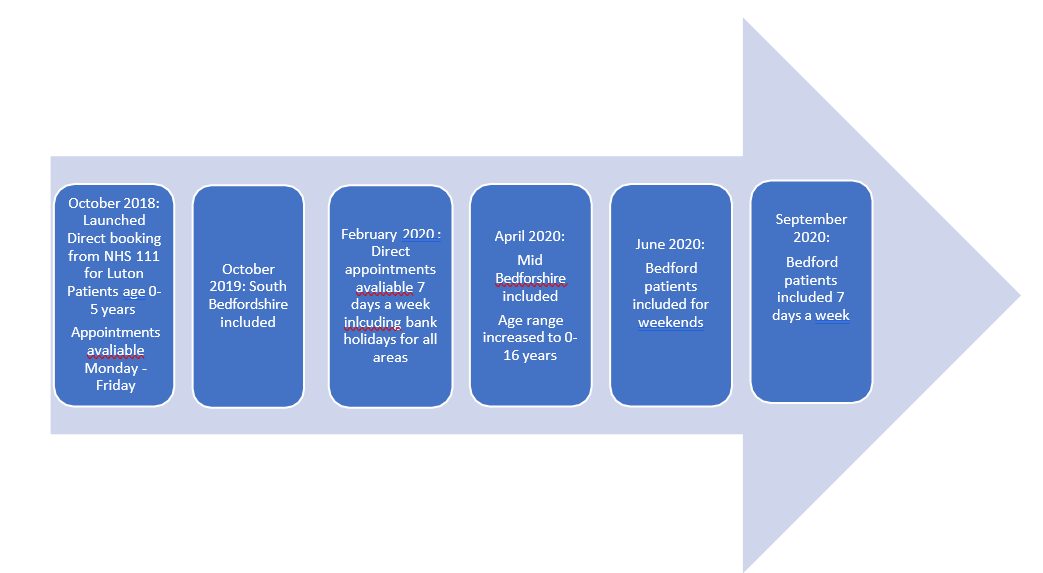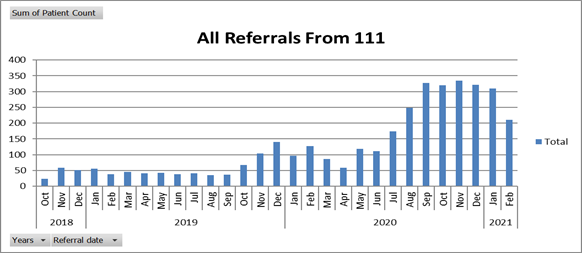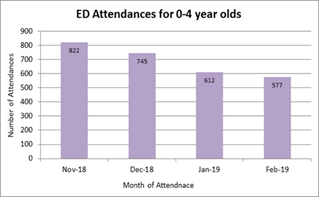Same Day Emergency Care: Direct Booking From NHS 111
Case Study: Luton and Bedfordshire Paediatric Direct Booking From NHS 111
(Children's Rapid Response Team)
Same Day Emergency Care (SDEC) is a model of care aimed at minimising patient delays in the emergency patient pathway and allows services to care for patients within the same day of arrival as an alternative to hospital admission. National SDEC priorities include restoring SDEC services in order that they provide a minimum of 12 hours per day as well as developing access to services directly so that models of care support improved patient flow, particularly utilising 111 and 999 services.
This case study has been developed as part of a series of case studies to highlight best practice across England published by NHS England and Improvement.
Overview
The Children’s Rapid Response Team in Luton launched a referral pathway in 2018 that enabled Hertfordshire Urgent Care (HUC) as the local NHS 111 provider to directly book appointments for children. Noticeably 22% of the Luton population are under 15 compared with 18% regionally and nationally of which 8% are aged 0-4 years old.
Direct appointment bookings have been an integral part of the Luton urgent Care strategy aiming to reduce the demands on emergency departments (ED) and strengthening access to urgent primary and community services. This referral route has provided an appropriate alternative for children that may have otherwise been directed to an Emergency Department or been dispatched an ambulance via NHS 111.The direct referral process was endorsed via the Luton A & E task and finish group alongside council members and commissioning groups.
The community clinics are run by band 7 clinicians with lead nurses in each clinic, the nurse practitioners have direct access to the paediatric registrar on call for each acute hospital for senior clinical support.
Referrals are based on disposition DX coding within the Directory of Service (DOS) which is an outcome reached following a triage with a health advisor or clinician within the NHS 111 service. Appointments were initially made available Monday to Friday 0800-1800 with Adastra and SystmOne (providing the technical platform). The service successfully expanded access to NHS111 by operating over a wider footprint, with extended days and timeframes of available appointments. The service identified benefits early on and outlined below is a timeline of the expansion from 2018 - 2021:

What were the results
The results below highlight the number of referrals being made by NHS 111 from launch in 2018, the increase in numbers directly relate to expansion of the patient coverage across Luton and Bedfordshire.

Quantitative data highlights up to 327 patients per month have been able to directly access the service from NHS 111, previously a number of these patients would be been referred to an Emergency Department. The key achievement is demonstrated in the majority of referrals being seen within a short time frame, allowing appointments to be booked on the same day.

Referral pathways are focused on alternatives to hospital attendance, however, a success showed that patients received earlier detection of serious signs of illness. For example, a Wilm’s tumour was diagnosed following an effective referral from a nurse in the community clinic who had picked up on key symptoms after a face to face appointment was conducted. This early detection resulted in hospital treatment starting within a few days and highlights the importance of direct referral.
A key consideration was to improve patients experience through direct referral also offering parents education around their child’s healthcare, as appropriate during appointments. Patients feedback has been pivotal in the ongoing development of the service, and has been extremely positive:

What were the challenges?
Technical challenges were faced early on delaying the original start date, these were overcome by reviewing the email destination to allow more effective monitoring of the mailbox. A process was put into place to enable a direct line of communication with the NHS 111 team was important for early discussion around issues. There have been inappropriate referrals made which are rejected by the nursing team, but these are feedback in real time via the shift manager at HUC. Feedback is always followed up with a healthcare professional feedback form to ensure continuous learning. On occasion appointments were booked outside of the operating hours, specifically when the call was taken outside of HUC and an email sent as opposed to an appointment system being utilised. The solution for this was to ensure DOS profiled the service only during the opening hours and therefore didn’t return for NHS 111 outside of this.
During the Covid pandemic the service ensured they adapted the service effectively to meet the requirement of infection control processes. NHS 111 referrals continued to accept the same criteria and DX coding, however each referral made was intercepted by telephone call from the rapid response team before a face to face appointment was confirmed.
What were the learning points?
Patients and parents were not involved in the planning and development of the direct referral from NHS 111. Reflecting on this the team feel this is an important factor in any future developments of the service.
As part of the design process, the clinical team has built up a better understanding the complexity and triage system within NHS 111 pathways. There has also been recognition around the impact of DOS and how the profiling of services can enhance the patient experience and referral process.
Next steps
The service has already expanded its referral options to NHS111 with increased patient footprint and opening hours over the last 2 years. There is now consideration in expanding the offer to 0800-2000 service 7 days a week which will offer more appointments during the out of hours period. There is also exploration work looking at intermediate care services during 2021.
Want to know more?
If so, please contact Lynna Fanning, Rapid Response Nurses Team Lead, Luton Children's and Adult's Community Health Services using: lynn.fanning@nhs.net
Lynn Fanning will also be speaking at the Urgent and Emergency Care Conference taking place on Tuesday 22nd and Wednesday 23rd June. This conference is free to attend for all NHS Staff and you can find out more here: https://emergencycareconference.co.uk/



